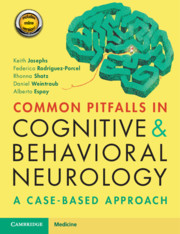Book contents
- Common Pitfalls in Cognitive and Behavioral Neurology
- Common Pitfalls in Cognitive and Behavioral Neurology
- Copyright page
- Dedication
- Contents
- Diseases Discussed in the Book
- Preface
- Acknowledgements
- Abbreviations
- Part 1 Missing the Diagnosis Altogether
- Part 2 Misidentifying the Impaired Cognitive Domain
- Part 3 Missing Important Clues in the History
- Part 4 Failure of Pattern Recognition
- Part 5 Difficult-to-Characterize Cognitive/Behavioral Disorders
- Part 6 Clinical Findings That Are Subtle
- Case 26 Something Does Not Look Right
- Case 27 Moving without Thinking
- Case 28 A Pause in the Clause
- Case 29 Seeing beyond Alzheimer Disease
- Case 30 “That Is Not How I Feel”
- Part 7 Misinterpreting Test Results
- Part 8 Attributing Findings to a Known or Suspected Disorder
- Part 9 Missing Radiographic Clues
- Part 10 Management Misadventures
- Index
- Plate Section (PDF Only)
- References
Case 27 - Moving without Thinking
from Part 6 - Clinical Findings That Are Subtle
Published online by Cambridge University Press: 03 November 2020
- Common Pitfalls in Cognitive and Behavioral Neurology
- Common Pitfalls in Cognitive and Behavioral Neurology
- Copyright page
- Dedication
- Contents
- Diseases Discussed in the Book
- Preface
- Acknowledgements
- Abbreviations
- Part 1 Missing the Diagnosis Altogether
- Part 2 Misidentifying the Impaired Cognitive Domain
- Part 3 Missing Important Clues in the History
- Part 4 Failure of Pattern Recognition
- Part 5 Difficult-to-Characterize Cognitive/Behavioral Disorders
- Part 6 Clinical Findings That Are Subtle
- Case 26 Something Does Not Look Right
- Case 27 Moving without Thinking
- Case 28 A Pause in the Clause
- Case 29 Seeing beyond Alzheimer Disease
- Case 30 “That Is Not How I Feel”
- Part 7 Misinterpreting Test Results
- Part 8 Attributing Findings to a Known or Suspected Disorder
- Part 9 Missing Radiographic Clues
- Part 10 Management Misadventures
- Index
- Plate Section (PDF Only)
- References
Summary
This 44-year-old right-handed woman with 12 years of education presented to the clinic with behavioral changes in the context of abnormal movements. Her husband noticed she became emotionally distant and withdrawn three years prior. Around the same time, she exhibited restlessness and continual movements in her hands, which later spread to her whole body. She was initially thought to be depressed and treated with sertraline (titrated up to 200 mg a day) with no benefit. Within a year of symptom onset, impulsive, inappropriate behaviors emerged (e.g., making comments about other people in public and eating from her husband’s plate), accompanied by some delusional thoughts (e.g., thinking her family was trying to hurt her and the government was spying on her).
- Type
- Chapter
- Information
- Common Pitfalls in Cognitive and Behavioral NeurologyA Case-Based Approach, pp. 87 - 88Publisher: Cambridge University PressPrint publication year: 2020



